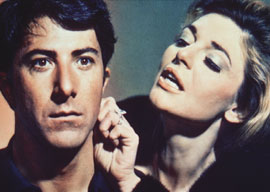
September 25, 2013

Dustin Hoffman and Anne Bancroft
Strikingly, Benjamin’s personality is a little like that of Bancroft’s real-life son Max Brooks, the very nervous author of World War Z. Max’s father Mel Brooks was busy filming The Producers, a less suave reflection of the same general urge as The Graduate.
Nichols has reflected that he originally wanted to make a message movie in which ‘‘I said some fairly pretentious things about capitalism and material objects, about the boy drowning in material things and saving himself in the only possible way, which was through madness.”
Nichols, however, came to notice that he really liked making money and buying material objects. His total take from The Graduate may have made him the first director in history to rake in one million dollars from a single movie. He’s since spent fortunes on hobbies such as Arabian horse breeding. Nichols once hired a friend of mine to create some home improvements for the palatial apartment he shares with his fourth wife, newscaster Diane Sawyer (who is so all-American that her father was a Republican judge in Louisville named…Tom Sawyer). Nichols was the most obnoxiously demanding client my friend ever endured.
Nichols likes to claim that he hadn’t realized what The Graduate was actually about until he saw it parodied in a juvenile humor magazine in October 1968:
It took me years before I got what I had been doing all along “ that I had been turning Benjamin into a Jew. I didn’t get it until I saw this hilarious issue of MAD magazine after the movie came out, in which the caricature of Dustin says to the caricature of Elizabeth Wilson, ‘Mom, how come I’m Jewish and you and Dad aren’t?’ And I asked myself the same question, and the answer was fairly embarrassing and fairly obvious: Who was the Jew among the goyim? And who was forever a visitor in a strange land?
This may be a story that has gotten better in Nichols’s retelling because the ethnic angle had not been so mysterious to Nichols’s underlings. J. W. Whitehead’s book Appraising The Graduate includes Hoffman’s memory of protesting to his self-confident director the implausibility of his casting:
“I’m not right for this part, sir. This is a Gentile. This is a WASP. This is Robert Redford.” …
Nichols replied, “You mean he’s not Jewish?”
“Yes, this guy is a super-WASP. Boston Brahmin.”
And Mike said, “Maybe he’s Jewish inside.”
During filming, Hoffman picked up his first groupie: ‘‘Beautiful, thin, a real shiksa goddess. I think Nichols took that as a sign “ at least somebody found me attractive. And it didn’t get past me, either!’‘
Screenwriter Buck Henry argued for Hoffman’s plausibility in the role by appealing to Cesare Lombroso‘s 1870s theory of racial atavism:
“You know my theory about California genetics? Jews from New York came to the Land of Plenty, and within one generation the Malibu sand had gotten into their genes and turned them into tall, Nordic powerhouses. Walking surfboards. We were thinking about how these Nordic people have Dustin as a son, and it’s got to be a genetic throwback to some previous generation.”
At whatever point Nichols got the idea, he ran with it:
“He couldn’t be a blond, blue-eyed person, because then why is he having trouble in the country of the blond, blue-eyed people? It took me a long time to figure that out”it’s not in the material at all. And once I figured that out, and found Dustin, it began to form itself around that idea.”
Whitehead says, “Nichols wanted Hoffman to project an estrangement that began in the blood.”
In 1938 Nichols had arrived in America from Berlin, where his anti-communist Jewish ancestors had found refuge from the Soviet Union. His father quickly became successful again in the US. And the son became even more so, first triumphing at stand-up comedy with Elaine May, then directing Neil Simon blockbusters on Broadway. His first movie, Who’s Afraid of Virginia Woolf?, earned him an Oscar nomination. He’s since completed the coveted EGOT career grand slam, winning four Emmys, one Grammy, one Oscar (for The Graduate), and nine Tonys.
But everybody feels a bit estranged and unappreciated, even if (or especially if) he is Mike Nichols.
Ultimately, The Graduate is about the pain of being Jewish in a gentile society. This theme had been downplayed by previous generations of Jewish filmmakers, who were grateful for how nice Americans had been to Jews. But as the years went by, Jewish-American artists discovered that there was little danger and much profit in violating this old norm.
Not surprisingly, Nichols’s ethnic alienation is reflected throughout The Graduate. In the wake of Israel’s smashing June 1967 triumph in the Six Day War, this proved tremendously popular with the American public at large.
For example, in the first scene in the hotel lobby, the unaggressive Benjamin has to step aside while dozens of pushy WASPs in formal attire shove through a revolving door ahead of him. And, of course, there’s the memorable last scene in which Benjamin rescues his shiksa goddess from her new husband at the Methodist church by swinging a giant crucifix at the resentful blond beasts.
It doesn’t get much more obvious than that.